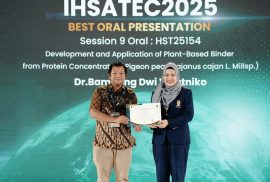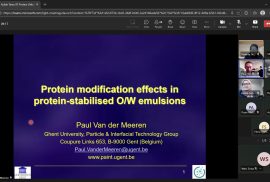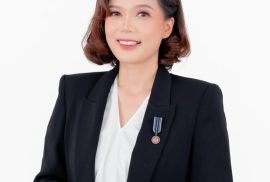
The Department of Food and Agricultural Technology at Universitas Gadjah Mada welcomed industry expert Zen Fauzan S., S.T.P., Head of Fragrance Development at PT. Mane Indonesia for a guest lecture on flavor technology. Held in Room 384 of the Faculty of Agricultural Technology, this session carried the theme: “Challenges of Sensory Evaluation in New Product Development During the Industrial Revolution.”
This guest lecture was mandatory for undergraduate students of TPHP enrolled in the Flavor Technology course and master’s students of ITP (Food Science and Technology) taking the Food Flavor course. It was also selectively open to students from other undergraduate and graduate programs, including TPHP, ITP, and THP.
In his presentation, Zen Fauzan provided an in-depth exploration of the intricate world of flavor and fragrance, encompassing technical aspects, sensory science, regulatory frameworks, and current industry trends. He guided participants through the layered components of a flavor—top notes, middle notes, and base notes—explaining how initial citrus freshness (top), tropical fruity body (middle), and long-lasting warm notes like vanilla or wood (base) all contribute to the sensory experience.
A critical point discussed was the role of aromatic compound volatility, evaporation rate, and molecular weight, which affect how and when aromas are released in both food and non-food products. Zen highlighted the application of encapsulation technologies in products like instant beverages, deodorants, and perfumes to ensure aromas are released at the right moment, such as when mixed with water or upon contact with sweat.
On the topic of product development, Zen elaborated on the challenges of sensory evaluation, specifically in identifying attributes, determining threshold levels, and masking off-flavors, particularly in fortified products containing vitamins. He emphasized that this evaluation extends beyond personal taste and requires specialized training to become a professional flavorist. One interesting tool introduced was the “Mane Strawberry Wheel”, a visual aid that reveals the complex blend of aroma components in strawberry, which may include hints of banana and pineapple.
The lecture also explored the differences between natural, nature-identical, and synthetic flavors, as well as the advanced technologies used in extracting aromatic compounds from natural sources, such as citrus fruits or Vietnamese lotus flowers. One such method, Jungle Essence, utilises a patented solvent extraction system, with the resulting compounds analyzed using GC-MS (Gas Chromatography-Mass Spectrometry) to identify and synthesize their volatile components.
From a regulatory perspective, Zen explained the differing standards applied to flavors (FDA) and fragrances (IFRA). He also addressed consumer safety, including awareness of allergenic substances that must be disclosed in final products.
This guest lecture broadened students’ understanding of the interdisciplinary nature of flavor and fragrance, combining food technology, chemistry, sensory biology, and even the emotional and narrative aspects of product experience. Zen underlined that in industries such as perfume and personal care, storytelling plays a crucial role in adding emotional value to products.
By engaging directly with an industry practitioner, students gained not only academic insights but also practical perspectives on research opportunities and career paths in the rapidly evolving flavor and fragrance sector, which is especially relevant in the era of Industry 4.0.
Documented by: KMTPHP
Written by: Firstnandita K.




